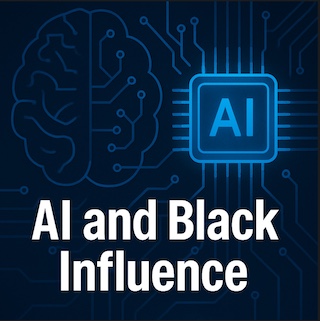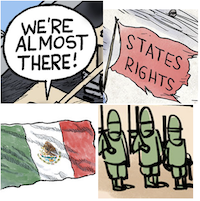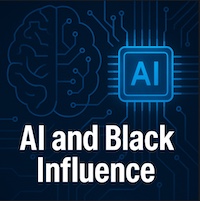
Image created by Tim Goler using AI-assisted design
If black people do not fight for influence digitally, we’ll lose it in reality. Artificial Intelligence (AI) is being sold as a tool of progress and equality, but beneath the surface, it may become the most advanced method of narrative control our people have ever faced: the ability to shape which stories are told, how they’re told, and who holds the mic.
The truth about AI is straightforward yet unsettling: it mirrors the biases and beliefs of its creators. AI is dominantly built by a limited demographic, often affluent, Western-trained, and culturally conservative, and it inherits their worldview. This inheritance doesn't merely reflect the cultural and racial biases of the dominant group; it enforces them.
Consider how "safety standards" on popular AI-driven platforms often suppress culturally nuanced forms of expression whether it's black intimacy, activism, kinship, or even natural aspects of life like breastfeeding and grief. TikTok has faced backlash for suppressing hashtags like #BlackLivesMatter, and image generators have been known to distort or erase black features altogether.
Imagine asking an AI to generate an image of a black family at church. The results are distorted, generic, or worse, absent. That absence isn’t technical. It’s historical. Instead of being a mirror reflecting diverse human experiences, AI frequently acts as a filter, defining the lived realities of black people as out-of-bounds or inappropriate.
There's a prevailing myth that having "access" to AI equates to empowerment. Yet access alone does not grant influence or control. Black users might have the ability to interact with AI, but we seldom have a meaningful role in shaping how it operates. Our voices are present in the technology but muted by the constraints established without our input.
The common solution proposed, "more diversity" within tech companies, is inadequate. You don’t fix a blueprint by changing who holds the pencil: you question what’s being drawn. Diversity alone cannot fix systemic problems when the system itself is built on foundations of exclusion and containment. Hiring a few more black individuals in tech does not automatically grant true power or authority to challenge or reshape the entrenched structures and priorities.
So, what must we do? The answer lies in self-determination and strategic action:
First, we must build parallel power structures. That means investing in and developing independent AI models rooted in black-centered language, values, and cultural frameworks.
Second, we must intervene narratively. By publishing, speaking, and creating visible challenges, we illuminate the contradictions and make the subtle forms of digital silencing clear.
Third, we need to expose AI’s limits by leveraging the very systems designed to silence us, highlighting content restrictions and the biases encoded into algorithms.
Lastly, we must educate our community. My admonition for us is to take AI seriously. AI is not a passing trend; it is already reshaping society. If we don’t engage now, we will be reshaped by it. AI literacy must become as foundational as financial literacy. It should be introduced across our entire educational pipeline, from K–12 schools in urban communities to historically Black colleges, churches, and grassroots institutions. Understanding AI is not just technical education; it's a survival skill. If we don’t get this right, our children will inherit tools designed to erase them.
We stand on a new terrain of struggle. Just as we historically fought battles over education, labor rights, policing, and land, we now face a critical fight for digital representation and freedom. AI shapes more than virtual realities; it influences our actual lives, identities, and opportunities.
If we don't assert our voices in this digital landscape, we risk losing significant ground in our tangible world. This is our moment to act, not because we trust existing systems to include us, but precisely because we recognize the profound risks of being excluded.
M o r e:
The Quiet Dismantling
Inner Leadership: Becoming the Black Men We Need Now
To Unmake a People
Cloaked in Our Right Minds
The Real Fight Is Inside
• • •• • •
 Dr. Tim Goler is Associate Professor of Sociology and Urban Affairs at Norfolk State University. He also serves as the Director of Research at NSU’s Center for African American Public Policy. A native Clevelander, he hails from the city’s Glenville neighborhood and is co-founder of PolicyBridge.
Dr. Tim Goler is Associate Professor of Sociology and Urban Affairs at Norfolk State University. He also serves as the Director of Research at NSU’s Center for African American Public Policy. A native Clevelander, he hails from the city’s Glenville neighborhood and is co-founder of PolicyBridge.














